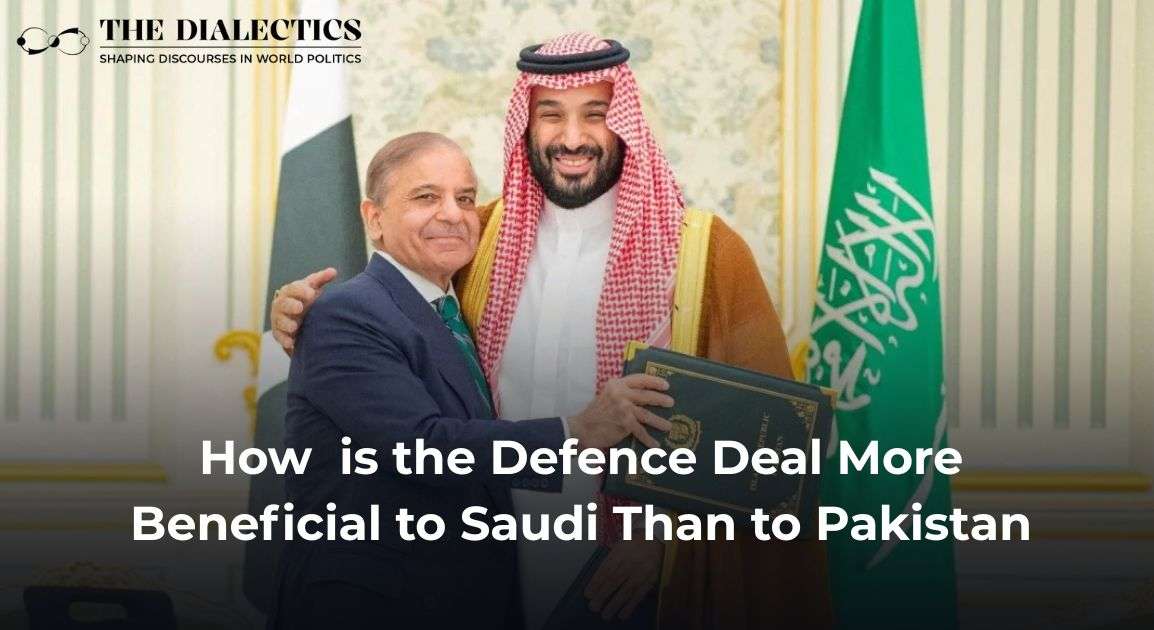In a surprise move, Pakistan and the Kingdom of Saudi Arabia deepened their strategic ties by signing a comprehensive defence deal. The two key Islamic nations, one with the Islamic heritage and religious sites and the other with nuclear bombs elevated their defence relation by adding a clause in this pact that declares that ‘any aggression against either country shall be considered an aggression against both.’ According to the defence pact, Pakistan’s nuclear umbrella will now shield Saudi Arabia in West Asia. The joint statement following the official visit noted that Sharif arrived in Riyadh on the invitation of Saudi Crown Prince Mohammed bin Salman, with the two leaders convening at the Al-Yamamah Palace.
This pact, as per the statement, builds on the ‘historic partnership extending for nearly eight decades’ between the Kingdom and Pakistan. It is rooted in the ‘bonds of brotherhood and Islamic solidarity, as well as shared strategic interests and close defence cooperation between the two countries.’ Spanning West Asia and South Asia, this defence alignment between the Kingdom and Islamabad has inevitably raised eyebrows among academics, journalists, and policymakers in New Delhi. Yet, India should not be concerned about this development. The agreement is more beneficial to Saudi Arabia’s security imperatives and national interests than to Pakistan or targeting India.
Let’s understand this in a detailed manner. The rationale behind this comprehensive defence pact—especially when the US and Saudi Arabia are longstanding allies—one must understand the evolving security situation of the region. At its core, this accord overwhelmingly favours Saudi Arabia, not Pakistan. The recent Israeli attack on Qatar, a close US ally, has seriously affected the Arab nations, increasing fears for their security and national interests. If Israel can strike Qatar despite the US security umbrella, it says that no one in the region is safe and can be attacked at any time. This situation creates a sense of security dilemma. This incident also outlined a harsh reality, the US security umbrella offers little security assurance to Gulf nations/Arab nations, which have been traditional US allies and Israel emerges as the principal threat. In such a condition, Arab states seek robust deterrence, and the Kingdom has astutely turned to a partner with nuclear capabilities, and an adversary of Israel and Pakistan fits this profile perfectly.
Saudi’s Nuclear Deterrence Outsourcing
By signing this pact, Riyadh is effectively positioning itself under Pakistan’s nuclear deterrence to ward off any potential Israeli aggression on its soil by countering the threat through balancing. This is not mere speculation; it reflects Riyadh’s practical balancing act against a destabilised region. Pakistan’s nuclear power, long viewed as a counterbalance in a volatile neighbourhood, now extends its shield to the Kingdom. This has just filled the gap left by the US commitments.
Moreover, Pakistani equipment and soldiers have previously been deployed by the Kingdom in its fight against the Houthis in Yemen, and Saudi Arabia would likely to continue seeking such assistance in the future. This agreement gives an official announcement of these existing collaborations.
A natural question arises, why Pakistan, not India? The answer lies in New Delhi’s foreign policy. India maintains an exceptionally strong relationship with Israel, from defence cooperation to technology transfers to strategic alignment. Hence, India would never permit its defence equipment—including nuclear assets—to be utilised against Israel, a vital partner in the region. In contrast, Pakistan has no such qualms. It views its nuclear weapons as leverage to amplify its influence in a destabilised region, where its “religious brother” nations perceive Israel as an existential threat. For Islamabad, this pact means tangible economic benefits, as militarily, Saudi Arabia has little to offer. As the world’s largest arms importer, the Kingdom imports nearly all its weaponry, leaving no room for material contributions in defence that could be turned against India. Pakistan gains fiscal inflows through defence contracts, training deals, and investments, without Riyadh posing any enhanced military edge to Islamabad vis-à-vis New Delhi.
From Riyadh’s side, this alliance will likely prompt Saudi Arabia to criticise Indian actions against Pakistan and abstain from intervening in India-Pakistan conflicts at International forums. This shift is more a pragmatic necessity for the Kingdom, aimed at securing its territorial integrity and sovereignty at the time of any potential attack from its long-term regional adversary, Israel. Hence, India would have no reason to panic.
What was India’s Response
Even India’s official response to this pact has been measured and pragmatic. “We have seen reports of the signing of a strategic mutual defence pact between Saudi Arabia and Pakistan. The Government was aware that this development, which formalises a longstanding arrangement between the two countries, had been under consideration. We will study the implications of this development for our national security as well as for regional and global stability. The Government remains committed to protecting India’s national interests and ensuring comprehensive national security in all domains.”
This statement shows New Delhi’s mature restraint, acknowledging the pact’s evolution from historical ties while underscoring vigilance without alarmism. In the broader geopolitical mosaic of West Asia, where multipolarity is reshaping alliances, Saudi Arabia’s overtures to Pakistan highlight Riyadh’s diversification strategy.
India’s position remains enviable. In already deepened ties to the Gulf, evident in massive energy imports, labour remittances, and investments, New Delhi enjoys equitable relations with both Saudi Arabia and other Arab nations in the Gulf. The UAE and Saudi Arabia have invested billions in India’s infrastructure and defence sectors, while Pakistan’s overtures to Riyadh do little to undermine this. Moreover, India’s strategic autonomy allows it to navigate such pacts without entanglement, prioritising counter-terrorism cooperation and economic diplomacy.
Saudi’s Pragmatic Realism
The Kingdom, under Crown Prince Mohammed bin Salman, has long pursued Vision 2030, an ambitious blueprint for economic diversification and social reforms that demands regional and domestic stability. Persistent threats from Iran-backed proxies like the Houthis, along with Israel’s assertive posture, have forced Saudi Arabia to seek non-Western partners with nuclear capabilities.
For Pakistan, the gains are economic lifelines amid its domestic challenges. Islamabad’s economy, strained by debt and inflation, benefits immensely from Saudi investments and money. Yet, this does not translate into a zero-sum game against India. Pakistan’s military capabilities remain focused on its eastern border, and Saudi Arabia’s arms dependency ensures no surplus hardware flows to Pakistan to alter the balance in South Asia.
In effect, the Saudi-Pakistan defence agreement is a reflection of Riyadh’s realism. With this pact, the Kingdom has somehow tackled the Israeli threat and also underlined Islamic solidarity. It does little or no immediate threat to India; rather, it shows the necessity of keeping watch on the regional scenario without being reactive. While West Asia faces aggression and counter-aggression, New Delhi’s attention should be on securing its national interests by increasing its own deterrence and friendships. It will guarantee stability on its western edge. The agreement may trigger diplomatic waves, but it does not cause much change in the South Asian security.




